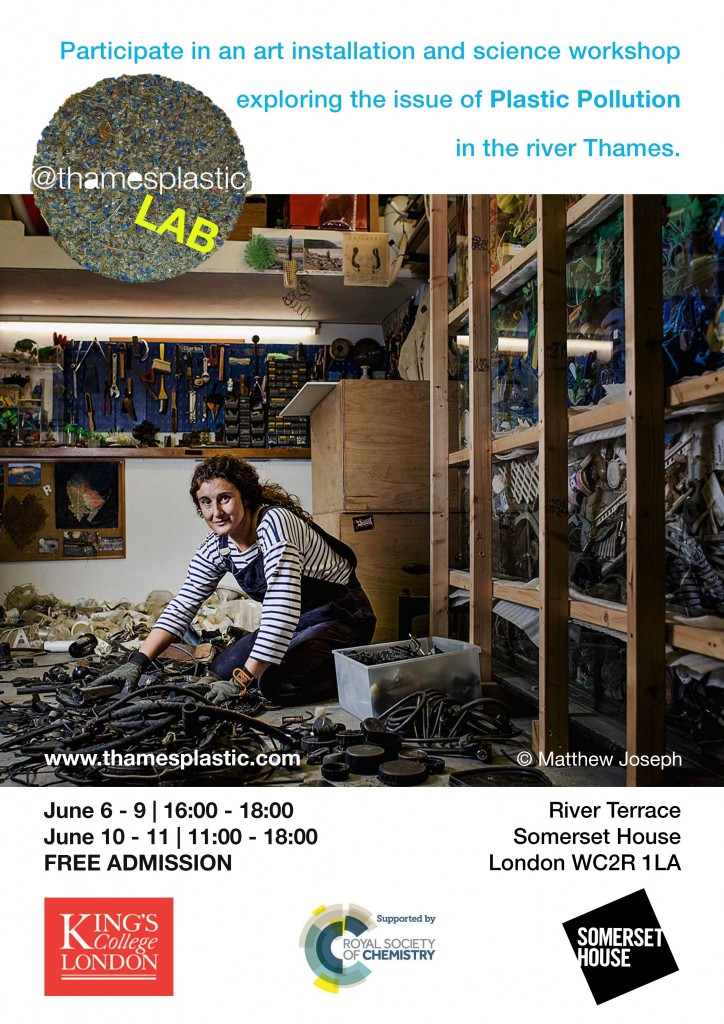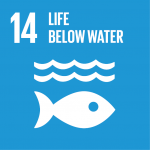Until Sunday, the 11th June, Thames Plastic are taking over the Somerset House River Terrace with their Thames Plastic Lab.
Over the last year, King’s artist in residence Maria Arceo and a group of volunteers (including Thames21, King’s staff, and students during our Sustainability Week) have collected plastic from the beaches of the Thames. They have then spent a few weeks at Canada Water, washing the plastic so it can be used. 
Now, the project has reached the next stage: sorting it by colour so it can be used in an art installation as part of the Thames Festival.
The Thames Plastic Lab is a collaboration between King’s College London’s Departments of Chemistry and Geography, the Royal Society of Chemistry and artist Maria Arceo, supported by the Cultural Institute at King’s. Throughout this week, they are inviting the public to come along and learn what kind of plastic ends up in the Thames, how it gets there, and what you can do. You can also pick a piece of plastic and ask for it to be analysed! In the end, all the plastic from the workshops will be turned into an art installation to raise awareness for the problem of plastic pollution in our rivers and oceans. The Plastic Lab has been a great success so far, you can see pictures of the event on Twitter.
The Thames Plastic Lab will remain open until the 11th June.
Opening times are:
9th June: 16:00-18:00
10th-11th June: 11:00-18:00
More information can be found here. Make sure to drop in!
#FFSLDN
Our neighbours from Hubbub are currently also running their own campaign to combat plastic waste in the Thames. With #FFSLDN (For Fish’s Sake London, don’t drop litter!), they are trying to engage Londoners in a conversation about our littering habits.
 For example, do you know what tidy littering is? It’s leaving your rubbish next to a bin, on top of an overflowing bin, or on a wall or ledge. It might seem innocent, but rubbish often falls off, gets blown away, and ultimately ends up in our great river. 300 tonnes of litter are cleared from the Thames every year – showing how important things like the Thames Plastic project are. Ultimately, plastic pollution becomes a very real problem for people. It is estimated that 70% of fish in the Thames have plastic in their guts, and plastic increasingly makes its way into our diets through fish that have swallowed small pieces of plastic. So next time you drop a piece of plastic, make sure it’s in a recycling bin!
For example, do you know what tidy littering is? It’s leaving your rubbish next to a bin, on top of an overflowing bin, or on a wall or ledge. It might seem innocent, but rubbish often falls off, gets blown away, and ultimately ends up in our great river. 300 tonnes of litter are cleared from the Thames every year – showing how important things like the Thames Plastic project are. Ultimately, plastic pollution becomes a very real problem for people. It is estimated that 70% of fish in the Thames have plastic in their guts, and plastic increasingly makes its way into our diets through fish that have swallowed small pieces of plastic. So next time you drop a piece of plastic, make sure it’s in a recycling bin!

